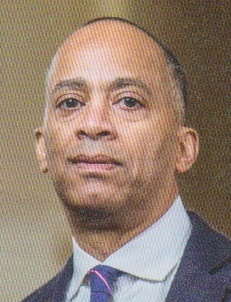


 Potts
vs Shaddock
Potts
vs Shaddock
Colgate Debate
LeRoy Potts, class of 1985, Leftist Democrat,
Immigration facilitator for DHS
article in Colgate Magazine
Summer 2022
Rick Shaddock, 1978, Right leaning Republican,
International development contractor for USAID and World Bank
- his opinion,
paragraph by paragraph, not speaking for the whole Class of 1978
nor the Colgate Debating Team
RESOLVED: It is better to export USA help to
develop foreign countries, than import foreigners for free stuff and their vote.
Open rebuttal to LeRoy Potts '85 about your
anti-Republican article in the leftist rag, Colgate Magazine for alumni. It is
hypocritical for a Democrat to unfairly criticize 1.2 million White soldiers,
lead by Republican President Lincoln, who fought to free the African slaves in
1865. Do you know that African tribe leaders sold their own race to be shipped
to southern American, Democrat farmers? Slavery started in Africa, with the dawn
of man, by 161900 BC. Northern Whites gave your great grand parents free food
and housing, and the opportunity to earn money, but that was not Ritzy enough?
We both live in DC (with black Democrat Mayors since 1975) whose Mayor Bowser
declared a Public Emergency over too many asylum seekers bussed to DC. You hurt
Uganda (76 average IQ) by helping their smartest to move to the USA, instead of
helping their country improve, USAID and World Bank missions. You support
illegal invaders who sneak into the USA and mostly vote Democrat in return for
welfare at US citizen tax payer expense. How about "Owning Up to the Past" of
your African slave selling ancestors, and help "Fixing the Present" and
http://StopAfricanSlavery.com
http://Colgate1978.com/article/PottsShaddockDebate
https://news.colgate.edu/magazine/2022/08/08/owning-up-to-the-past-and-fixing-the-present/
Speak freely and comment below and join the Platonic debate. :)

Black Conservative speaks the truth. African leaders sold their own race, ready
in cages, to slave traders.
Hilary Fordwich to Don Lemon: 'Well, I think you're right about reparations in
terms of if people want it though. What they need to do - is you always need to
go back to the beginning of a supply chain, where was the beginning of the
supply chain?
That was in Africa, and when it crossed the entire world, when slavery was
taking place. Which was the first nation in the world that abolished slavery?
The first nation in the world to abolish it, it was started by William
Wilberforce, was the British (in 1833).
In Great Britain, they abolished slavery, 2,000 Naval men died on the high seas
trying to stop slavery. Why? Because the African kings were rounding up their
own people, they had them on cages waiting in the beaches, no one was running
into Africa to get them."
https://www.youtube.com/watch?v=tObCZOGj4sk
White BBC reporter Ross Kemp risks his life to expose African slavery still
going on today.
https://rumble.com/v1bs2x7-black-slavery-in-africa-today-bbc-special.html

D.C. mayor Muriel Bowser declares Public Emergency over migrants and asylum
seekers arriving on buses
https://www.washingtonpost.com/dc-md-va/2022/09/08/bowser-public-emergency-migrant-buses/

Mayor Bowser openly discriminates against Whites, and announces racist home
ownership subsidies to Blacks, at the expense of tax payers of all colors.
https://mayor.dc.gov/release/mayor-bowser-launches-black-homeownership-strike-force-combat-racial-wealth-gap
"LeRoy Potts Jr. '85 found similarities in the situations of African Americans
who sought refuge during the Civil War and today's asylum seekers. "
Rick Shaddock '78 found similarities too:
both caused by Democrats who
* created US demand for slaves Africans caught
* open US southern border to "asylum (welfare) seekers"
"Potts is one of the co-founders of Colgate Alumni of Color."
In Physics, we learned that a spinning wheel of all colors turns flesh. Flesh
colored alums are People Of Color too.
I would like to join the CAoC, to help its Diversity, Equity, and Inclusion.
www.naawp.us/video/ColorWheel

1.2 million White soldiers, lead by Republican
President Lincoln, who fought to free the African slaves in the Civil War. The
people who started slavery by 16190 BC, caught their own people, sold them from
1619, and still have slave markets today, should not criticize the people who
stopped slavery in 1865.

"African states played a key role in the trade of enslaved people, and slavery
was a common practice among Sub Saharan Africans even before the involvement of
the Arabs."
https://en.wikipedia.org/wiki/History_of_slavery
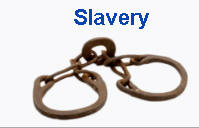
You hurt Uganda (76.42 average IQ) by helping their
smartest to move to the USA, instead of helping their country improve.
This lowered the average IQ of the USA.
https://worldpopulationreview.com/country-rankings/average-iq-by-country

I have done USAID and World Bank projects to, not drain developing countries'
high IQ people, but help Make Their Countries Great Again.
www.CICorp.com/client/USAID

For example: In retirement, thanks to Bitcoin, I funded the mission to install
internet fiber and Make Guatemala Great Again.
www.CICorp.com/client/Guatemala

"Potts is chief of research in the Refugee, Asylum,
and International Operations Directorate at U.S. Citizenship and Immigration
Services (USCIS), a component agency of the U.S. Department of Homeland
Security. He specializes in providing country conditions research to the
agency’s officers who decide refugee and asylum cases. "
* Government dependent, low IQ, compliant, likely Democrat voter? APPROVED
* Self sufficient, high IQ. skeptical, likely Republican voter? DENIED
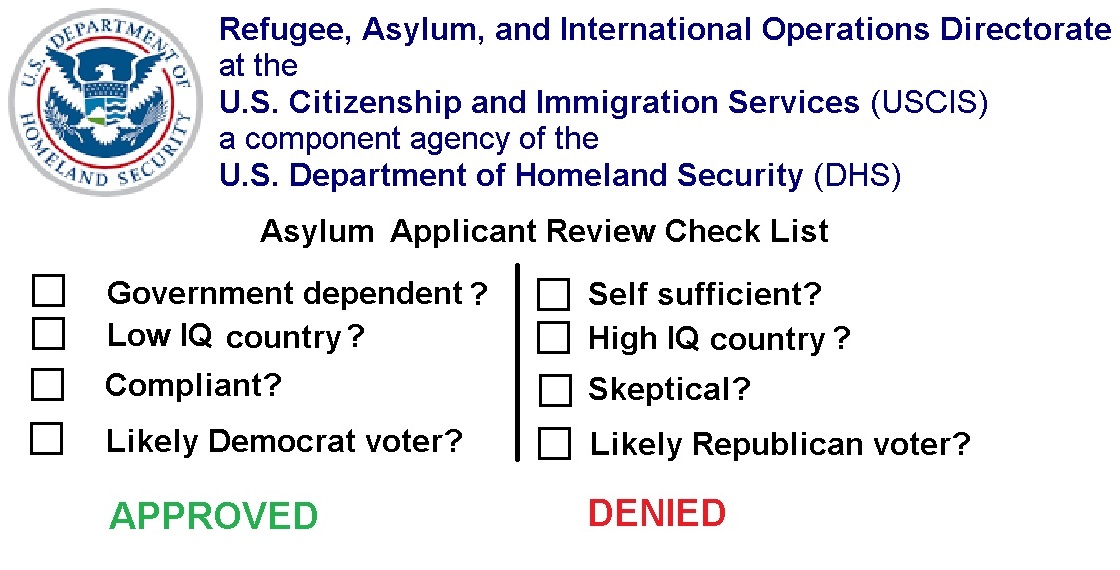
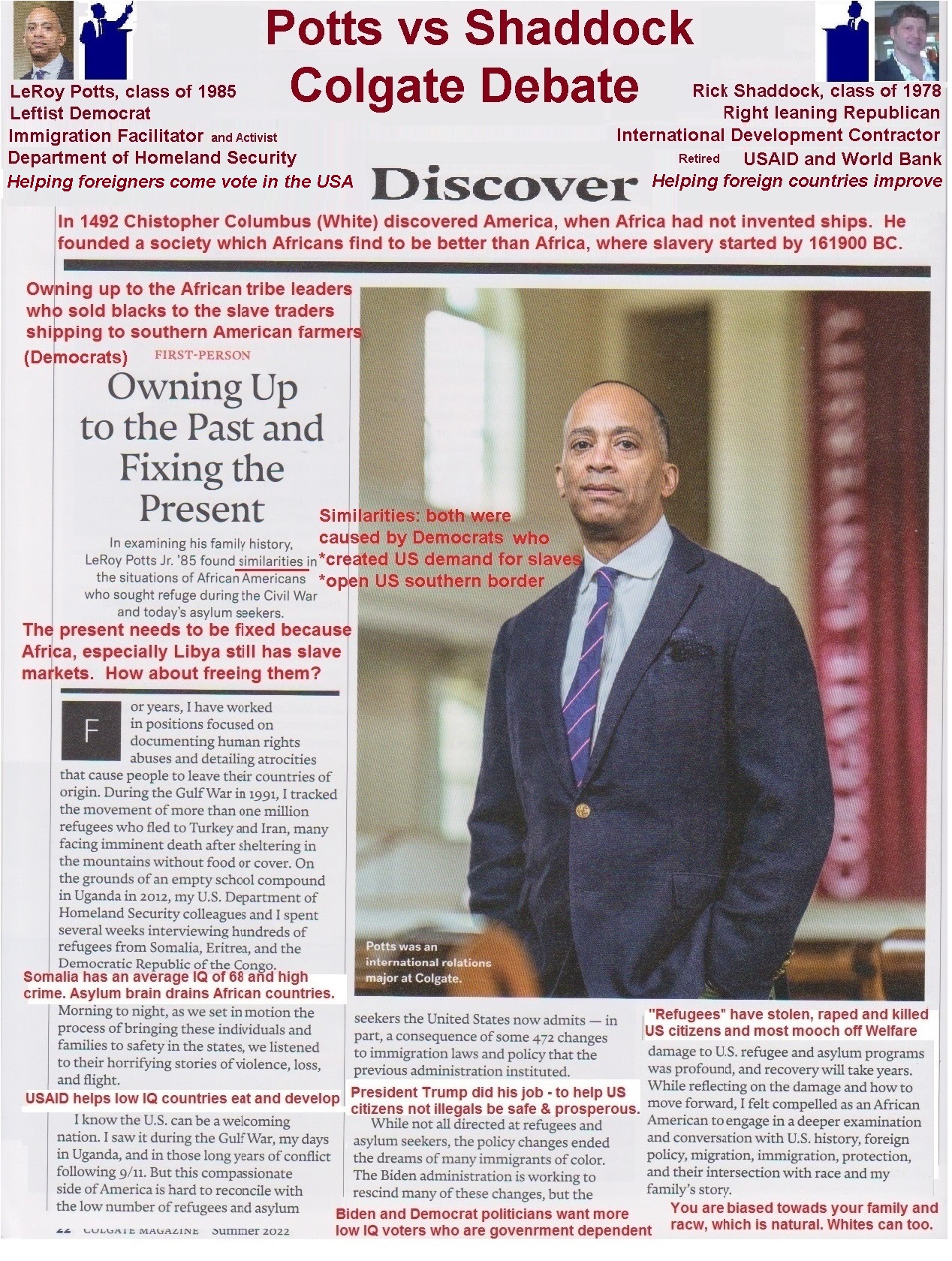
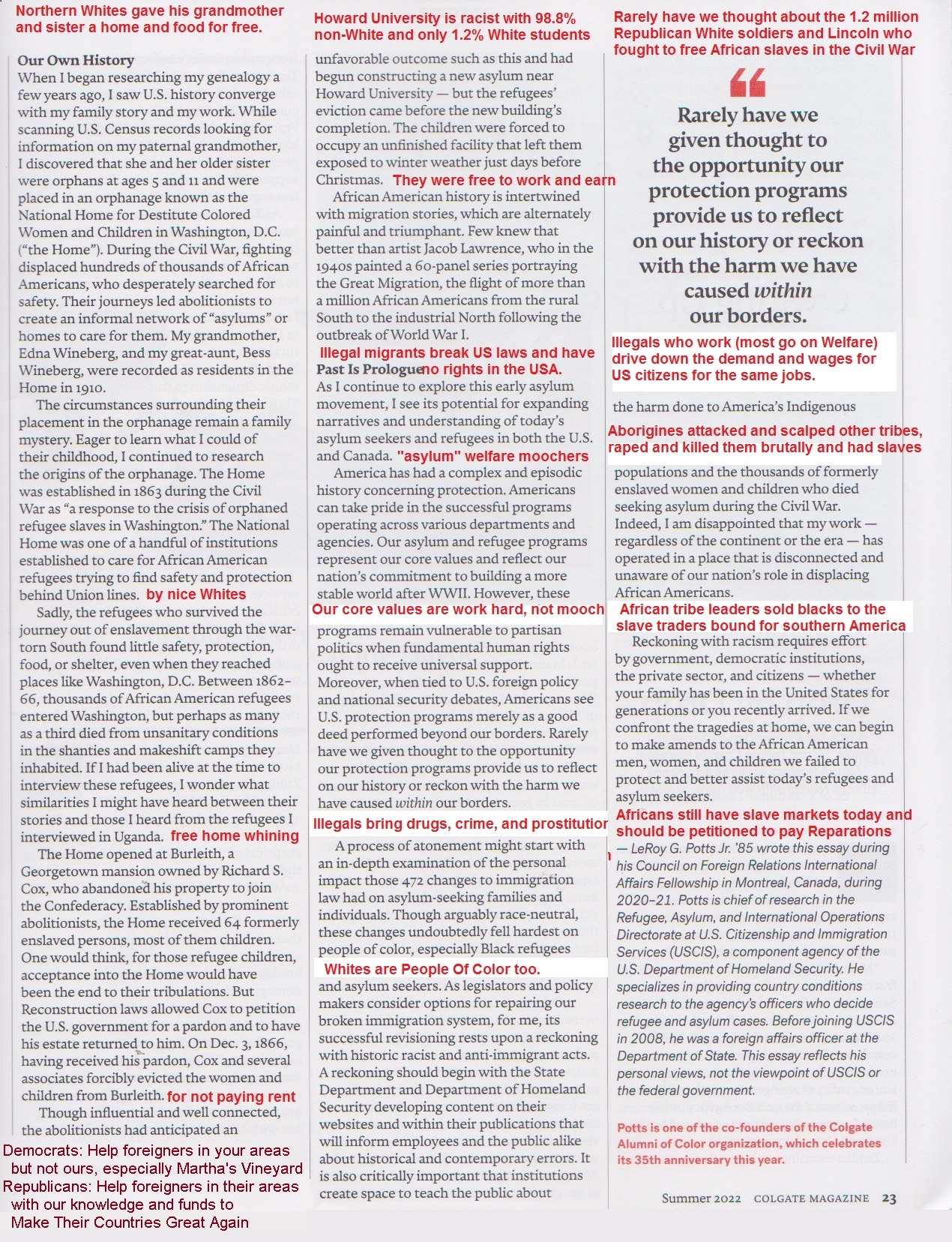
Democrats get an article in the Colgate Magazine, but MAGA Republicans cannot
even post on Facebook.
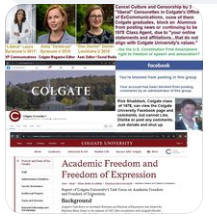
Cancel Culture and Censorship by 3 "liberal" Censorettes in Colgate's Office of
ExCommunications, none of them Colgate graduates, block an Alumnus from posting
news or continuing to be 1978 Class Agent, due to "your online statements and
affiliations...that do not align with Colgate University's values."
- like the First Amendment for freedom of speech and association?
"Liberal" Laura - Syracuse U 2017- VP of Communications
Aleta "Delete-ya" - Syracuse U 2015 - Colgate Magazine Editor
"Doc Doctor" Docter - Louisiana U 2016 - Assistant Editor / Social Media
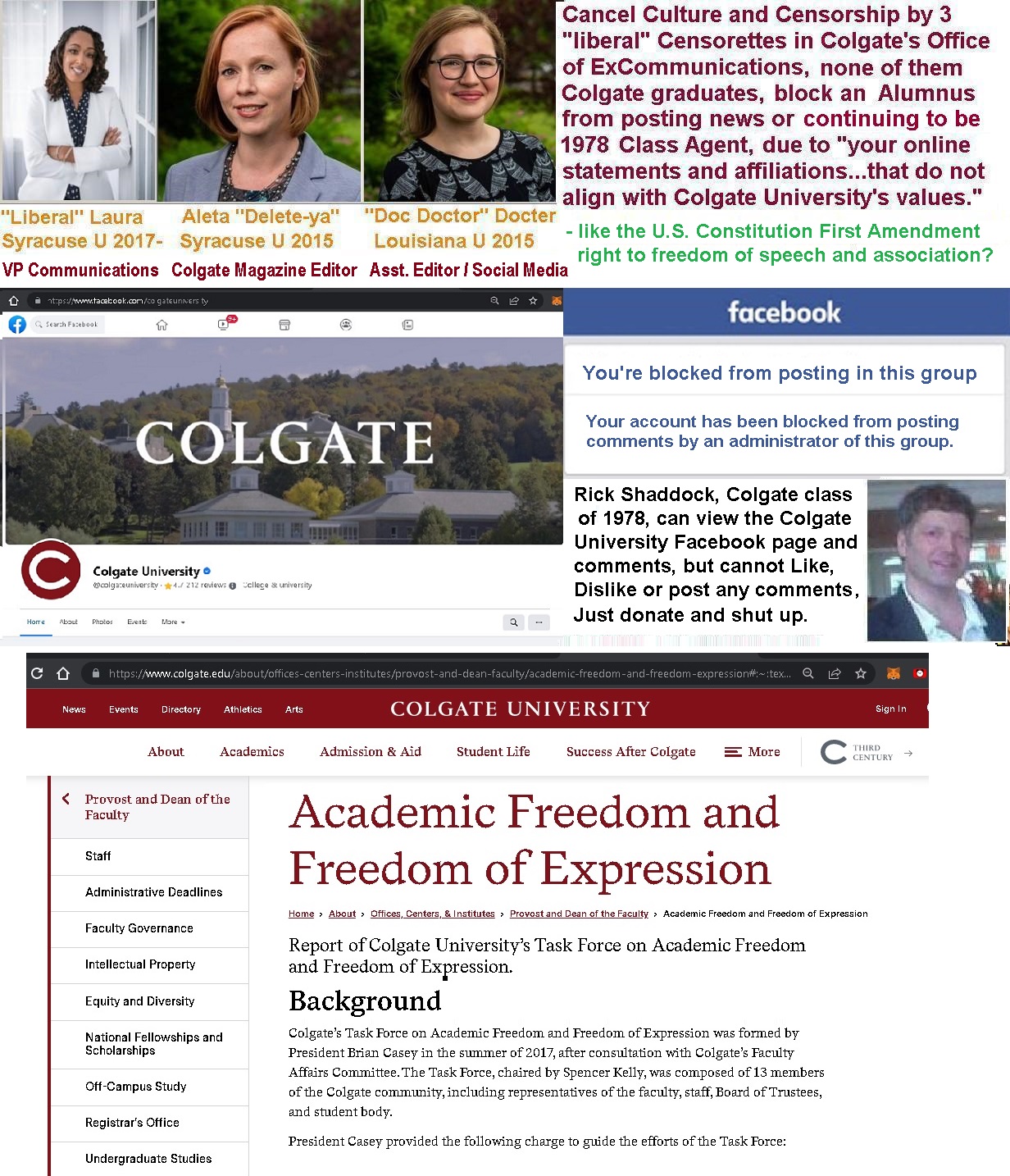
https://www.colgate.edu/about/offices-centers-institutes/provost-and-dean-faculty/academic-freedom-and-freedom-expression
Colgate's largest demographic, White men, should not be
subjected to repeated insults, and racial slurs (being called uncolorful people)
when reading the Colgate Magazine..
https://news.colgate.edu/magazine/2022/08/08/owning-up-to-the-past-and-fixing-the-present/
https://news.colgate.edu/magazine/2022/08/08/owning-up-to-the-past-and-fixing-the-present/
Owning Up to the Past and Fixing the Present
SUMMER 2022
|
Whites have
apologized again and again for slavery, and were the first race to
officially end slavery. The ones who have to "own up to the past" are
African Americans, whose own people captured them in Africa and sold them to
southern American Democrat farmers.
They also must help Fix the Present because there are still slave markets
in Africa. Please sign the petition:
StopAfricanSlavery.com |
|
In examining his family history, LeRoy Potts Jr. ’85 found similarities in
the situations of African Americans who sought refuge during the Civil War
and today’s asylum seekers.
|
|
| For years, I
have worked in positions focused on documenting human rights abuses and
detailing atrocities that cause people to leave their countries of origin.
During the Gulf War in 1991, I tracked the movement of more than one million
refugees who fled to Turkey and Iran, many facing imminent death after
sheltering in the mountains without food or cover. On the grounds of an
empty school compound in Uganda in 2012, my U.S. Department of Homeland
Security colleagues and I spent several weeks interviewing hundreds of
refugees from Somalia, Eritrea, and the Democratic Republic of the Congo.
Morning to night, as we set in motion the process of bringing these
individuals and families to safety in the states, we listened to their
horrifying stories of violence, loss, and flight. |
|
| I know the U.S.
can be a welcoming nation. I saw it during the Gulf War, my days in Uganda,
and in those long years of conflict following 9/11. But this compassionate
side of America is hard to reconcile with the low number of refugees and
asylum seekers the United States now admits — in part, a consequence of some
472 changes to immigration laws and policy that the previous administration
instituted. |
|
| While not all
directed at refugees and asylum seekers, the policy changes ended the dreams
of many immigrants of color. The Biden administration is working to rescind
many of these changes, but the damage to U.S. refugee and asylum programs
was profound, and recovery will take years. While reflecting on the damage
and how to move forward, I felt compelled as an African American to engage
in a deeper examination and conversation with U.S. history, foreign policy,
migration, immigration, protection, and their intersection with race and my
family’s story. |
|
Our Own History
When I began researching my genealogy a few years ago, I saw U.S. history
converge with my family story and my work. While scanning U.S. Census
records looking for information on my paternal grandmother, I discovered
that she and her older sister were orphans at ages 5 and 11 and were placed
in an orphanage known as the National Home for Destitute Colored Women and
Children in Washington, D.C. (“the Home”). During the Civil War, fighting
displaced hundreds of thousands of African Americans, who desperately
searched for safety. Their journeys led abolitionists to create an informal
network of “asylums” or homes to care for them. My grandmother, Edna
Wineberg, and my great-aunt, Bess Wineberg, were recorded as residents in
the Home in 1910. |
|
| The
circumstances surrounding their placement in the orphanage remain a family
mystery. Eager to learn what I could of their childhood, I continued to
research the origins of the orphanage. The Home was established in 1863
during the Civil War as “a response to the crisis of orphaned refugee slaves
in Washington.” The National Home was one of a handful of institutions
established to care for African American refugees trying to find safety and
protection behind Union lines. |
|
| Sadly, the
refugees who survived the journey out of enslavement through the war-torn
South found little safety, protection, food, or shelter, even when they
reached places like Washington, D.C. Between 1862–66, thousands of African
American refugees entered Washington, but perhaps as many as a third died
from unsanitary conditions in the shanties and makeshift camps they
inhabited. If I had been alive at the time to interview these refugees, I
wonder what similarities I might have heard between their stories and those
I heard from the refugees I interviewed in Uganda. |
|
| The Home opened
at Burleith, a Georgetown mansion owned by Richard S. Cox, who abandoned his
property to join the Confederacy. Established by prominent abolitionists,
the Home received 64 formerly enslaved persons, most of them children. One
would think, for those refugee children, acceptance into the Home would have
been the end to their tribulations. But Reconstruction laws allowed Cox to
petition the U.S. government for a pardon and to have his estate returned to
him. On Dec. 3, 1866, having received his pardon, Cox and several associates
forcibly evicted the women and children from Burleith. |
|
| Though
influential and well connected, the abolitionists had anticipated an
unfavorable outcome such as this and had begun constructing a new asylum
near Howard University — but the refugees’ eviction came before the new
building’s completion. The children were forced to occupy an unfinished
facility that left them exposed to winter weather just days before
Christmas. |
|
| African American
history is intertwined with migration stories, which are alternately painful
and triumphant. Few knew that better than artist Jacob Lawrence, who in the
1940s painted a 60-panel series portraying the Great Migration, the flight
of more than a million African Americans from the rural South to the
industrial North following the outbreak of World War I. |
|
Past Is Prologue
As I continue to explore this early asylum movement, I see its potential for
expanding narratives and understanding of today’s asylum seekers and
refugees in both the U.S. and Canada. |
|
| America has had
a complex and episodic history concerning protection. Americans can take
pride in the successful programs operating across various departments and
agencies. Our asylum and refugee programs represent our core values and
reflect our nation’s commitment to building a more stable world after WWII.
However, these programs remain vulnerable to partisan politics when
fundamental human rights ought to receive universal support. Moreover, when
tied to U.S. foreign policy and national security debates, Americans see
U.S. protection programs merely as a good deed performed beyond our borders.
Rarely have we given thought to the opportunity our protection programs
provide us to reflect on our history or reckon with the harm we have caused within our
borders. |
|
|
Rarely have we given thought to the opportunity our
protection programs provide us to reflect on our history or reckon with the
harm we have caused within our
borders.
LeRoy G. Potts Jr.
’85 |
|
| A process of
atonement might start with an in-depth examination of the personal impact
those 472 changes to immigration law had on asylum-seeking families and
individuals. Though arguably race-neutral, these changes undoubtedly fell
hardest on people of color, especially Black refugees and asylum seekers. As
legislators and policy makers consider options for repairing our broken
immigration system, for me, its successful revisioning rests upon a
reckoning with historic racist and anti-immigrant acts. A reckoning should
begin with the State Department and Department of Homeland Security
developing content on their websites and within their publications that will
inform employees and the public alike about historical and contemporary
errors. It is also critically important that institutions create space to
teach the public about the harm done to America’s Indigenous populations and
the thousands of formerly enslaved women and children who died seeking
asylum during the Civil War. |
|
| Indeed, I am
disappointed that my work — regardless of the continent or the era — has
operated in a place that is disconnected and unaware of our nation’s role in
displacing African Americans. |
|
| Reckoning with
racism requires effort by government, democratic institutions, the private
sector, and citizens — whether your family has been in the United States for
generations or you recently arrived. If we confront the tragedies at home,
we can begin to make amends to the African American men, women, and children
we failed to protect and better assist today’s refugees and asylum seekers. |
|
|
— LeRoy G. Potts Jr. ’85 wrote this essay during his Council on Foreign
Relations International Affairs Fellowship in Montreal, Canada, during
2020–21. Potts is chief of research in the Refugee, Asylum, and
International Operations Directorate at U.S. Citizenship and Immigration
Services (USCIS), a component agency of the U.S. Department of Homeland
Security. He specializes in providing country conditions research to the
agency’s officers who decide refugee and asylum cases. Before joining USCIS
in 2008, he was a foreign affairs officer at the Department of State. This
essay reflects his personal views, not the viewpoint of USCIS or the federal
government. |
|
|
Potts is one of the co-founders of the Colgate Alumni of Color organization,
which celebrates its 35th anniversary this year. |
|



 Potts
vs Shaddock
Potts
vs Shaddock 











